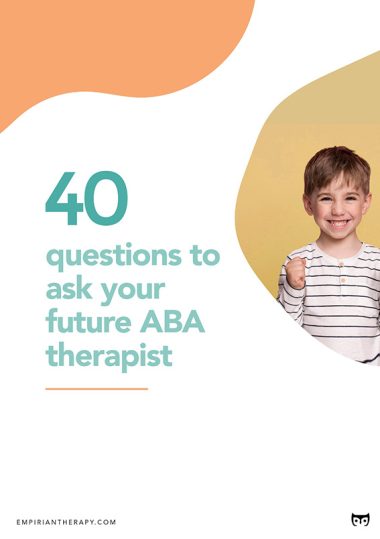When a child is struggling, there are a lot of terms that get thrown at already nervous parents. Autism Spectrum Disorder. Cognitive Testing. Applied Behavior Analysis. Language Processing Disorder. It may seem scary—but mostly that’s because those terms are just not familiar or explained well.
If you’re reading this you’re probably already feeling overwhelmed like many parents feel when they realize their child needs help. Getting stuck in an avalanche of information can keep you from finding the solution. The research on behavior interventions states that caregivers’ adherence to the behavior plan improves the outcomes, and being informed is the first step to being adherent. Below we will explain ABA therapy and shine a light on this ever-growing and evolving form of therapy that is helping thousands of children overcome their obstacles.
What is ABA, really?
Before we talk about how ABA therapy can benefit your child, we have to understand what it is. The acronym itself stands for Applied Behavior Analysis. ABA involves using the science of behavior to solve real-life problems. All behavior is a product of multiple factors and the environment surrounding the behavior. ABA aims to analyze and change those factors, leading to desired changes in behavior.
The building blocks of ABA are the ABCs of behavior: Antecedent (A) Behavior (B) and Consequence (C).
- Antecedents are the setting and/or circumstances that exist before the behavior occurs. Antecedents include the immediate environment, instructions, as well as motivations (such as hunger, thirst, lack of attention) and prompts (gestural, verbal and physical cues to assist in task completion).
- Behavior is any action performed by a person. It can be overt—able to be noticed by others, or covert—invisible to others (such as with thoughts or feelings)
- Consequences are events that follow behavior. Events that immediately follow a behavior affect the likelihood of the person engaging in that behavior in the future.
How will ABA therapy help my child?
Behavior analysts observe and examine the ABCs and make changes to the antecedents and/or consequences, to change behavior—either to teach or increase behaviors that are constructive, or decrease behaviors that impact learning and relationships. Throughout treatment, ABA therapists take data, analyze that data to determine if a behavior has increased or decreased to the desired level, and make adjustments based on the data analysis.
Who can get ABA therapy?
ABA was first used—and therefore most often used—with people with autism and intellectual disabilities, but because ABA is based on the science of behavior, it can be used to improve the life of any person, whether or not they have a diagnosis.
Other areas in which ABA can help include:
- Social and/or relationship difficulties
- Communication obstacles
- Behavioral issues related to attention disorders
- Self-management and habit reversal
- Self-care difficulties
- Involuntary movements or tics
- Sports or brain injury complications
- Substance abuse or other addiction disorders
- Mental health concerns
- Physical health/medical concerns
Changing lives, one reaction at a time.
Therapists in the ABA field are trained and equipped with the skills to help you and help your child improve their life. Many parents are amazed at how different their child behaves when elements of the usual circumstances are changed.
Stay informed about ABA therapy with Part 2 of this series—“A Peek Inside an ABA Therapy Session.” You’ll get a glimpse into an ABA therapy session, so you’ll have a better idea of what to expect.
You are not alone!
If you are the parent or concerned loved one of someone going through any of the challenges discussed above, please don’t hesitate to reach out for help! Issues that are addressed sooner have a greater rate of success. The professional team at Empirian is here to assist and direct you toward positive, long-lasting changes in behavior.


